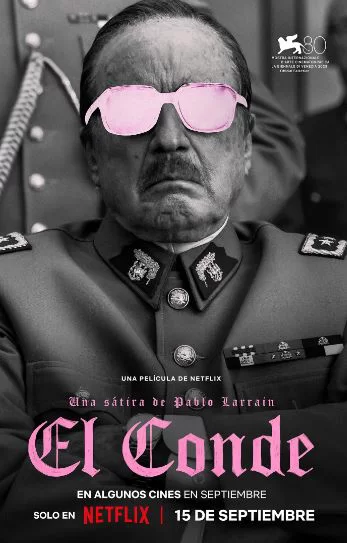
“El Conde” (“The Count”) (2023). Cast: Jaime Vadell, Gloria Münchmeyer, Alfredo Castro, Paula Luchsinger, Stella Gonet, Catalina Guerra, Amparo Noguera, Antonia Zegers, Marcial Tagle, Diego Muñoz, Clemente Rodriguez, Sofia Maluk, Marcelo Alonso, Daniel Contesse, Daniela Seguel, Jaime McManus. Director: Pablo Larraín. Screenplay: Guillermo Calderón and Pablo Larraín. Book: Augusto Pinochet Ugarte, A Journey Through Life: Memoirs of a Soldier. Web site. Trailer.
This “biography” of Pinochet (Jaime Vadell) employs an alternative approach to telling his story, one that’s decidedly more metaphorical than literal. Considering the dictator’s brutal nature during his reign (1973-1990) and the relentless drain his tactics placed on Chilean civilians and society during that time, director Pablo Larraín has chosen to quite fittingly portray him as a vampire. And, to that end, the filmmaker tells Pinochet’s story in the style of director F.W. Murnau’s black-and-white silent film classic, “Nosferatu” (1922), with all its cringeworthy creepy Gothic trappings.
The story focuses on Pinochet’s time after he’s no longer in power, a sad, old, lonely man living in destitute conditions in a remote, decrepit compound. But, to put the autocrat’s life in context, the film presents his back story as told by an unseen, eminently articulate English-speaking narrator (Stella Gonet). She begins by speaking of the immortal protagonist’s birth in 18th Century France as Claude Pinoche (Clemente Rodriguez), a viciously unruly youth who was abandoned by his mother (Sofia Maluk) and came of age as a heartless royalist soldier during the French Revolution. It was during this time that he discovered his vampiric nature and adopted his penchant for vehemently supporting established, reactionary regimes. He carried these qualities forward during what appeared to be a series of “lifetimes,” ever fighting for archaic causes on the brink of collapse. He did his duty well, at least in the eyes of those he was supporting, but always as a soldier and never anything more.
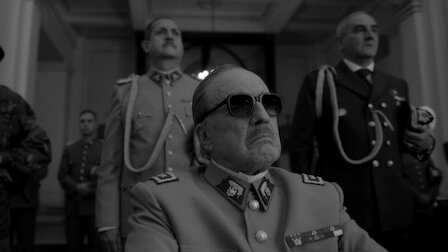
By the mid 20th Century, however, Pinoche had tired of always fulfilling the role of a fighting man. Through his many years of combat, he had grown aware of what works and what doesn’t during the turmoil of struggling military and political campaigns. And so, with this outlook, he decided to change tracks, launching himself onto a path in which he sought to acquire leadership powers, an opportunity he found in Chile, a nation wrestling with finding a direction for its future. After rising through the country’s political and military ranks, the young, ambitious renamed would-be autocrat (Daniel Contesse) was poised to move ahead with his plans. That opportunity finally arrived in 1973, when he helped lead the overthrow of President Salvador Allende, a democratically elected leader who rose to power three years earlier but who was an avowed Communist, the antithesis of Pinochet’s ideological leanings and someone whom he saw as a scourge on the nation. With the coup successful, Pinochet finally had what he had been seeking.
By the late ’80s, however, Pinochet had fallen out of favor, and a national referendum saw him ousted from office in 1990, but not without having amassed tremendous wealth in plundering the country and collecting a fortune in kickbacks from lackies and opportunists. Still, though, what is a former all-powerful dictator supposed to do with himself under conditions like these? In addition to possible threats of prosecution and the lingering animosity of the Chilean people, it certainly wouldn’t be in his best interests to maintain any kind of a public profile akin to what he had while in office. As a consequence, he chose to slink away into obscurity, a protected but unfulfilling life option. And, for someone who’s immortal, it doesn’t hold much promise for the future, despite having the capability to start over anew at any time of his choosing.
However, after having lived a life where he attained everything that he thought he wanted – and the eventual disappointment that came from that – he had to ask himself whether he wanted to rejuvenate himself and begin another new life with another new identity. Moreover, having allowed his program of regular feedings to lapse, he began falling prey to the ravages of time, including the effects of physical aging that typically afflict most mortals, such as failing health and lost memory. It grew so extreme, in fact, that he forgot where most of his wealth was hidden and how to access it. In light of that, from his standpoint, would it thus be worthwhile to start over without the financial resources he had accumulated to make his standard of living possible? Indeed, could he build the kind of new life he would require without the means to do so, even if his health were restored?
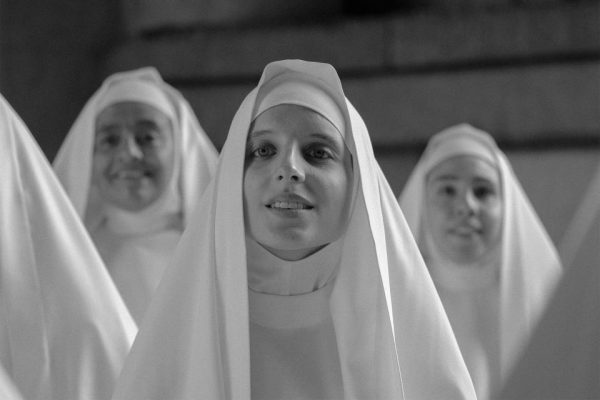
Such are the conditions in place as Pinochet’s story begins. He weighs his options about whether to start over or just allow himself to die. As noted, he doesn’t know where the money has gone. At the same time, he has lost interest in his wife, Lucia (Gloria Münchmeyer), a once-lusty, provocative beauty who, with age, has transformed into the embodiment of a ruthless, conniving crone. And then there is Pinochet’s best friend and butler, Fyodor (Alfredo Castro), and the Count’s five children (Catalina Guerra, Amparo Noguera, Antonia Zegers, Marcial Tagle, Diego Muñoz), all of whom are actively seeking to discover what happened to the cash, all of them driven by their own selfish motivations. In fact, the children are so anxious to get their hands on their father’s wealth that they’ve hired an accountant, Carmencita (Paula Luchsinger), to audit his books to see if the funds can be found. What the kids and their dad don’t know, however, is that the auditor is secretly a nun charged with exorcising Pinochet’s demons and, if possible, retrieving the lost funds and turning them over to the cardinal to whom she reports (Jaime McManus).
As all this is playing out, Pinochet still wavers about his future, although his head is certainly turned by the young accountant’s arrival at the family compound, especially now that Lucia is carrying on a less-than-clandestine affair with Fyodor in the wake of Augusto ignoring her and openly flirting with the nubile new visitor. And, in the nearby Chilean capital of Santiago, the city is being plagued by a string of new vampiric killings, making everyone wonder whether Augusto is returning to his old ways, rejuvenating himself perhaps as a prelude to secretly launching a new life for himself – and possibly absconding with the allegedly missing money, leaving everyone else high and dry. But, as matters continue going awry, none of these conditions can compare to the chaos and lunacy that emerge when the mysterious narrator at last appears in person, taking the story in an outrageous and even more unexpected direction.
Considering how everything has played out in Pinochet’s life, is the existence he envisioned for himself lived up to his expectations? If it hasn’t, his ennui and disillusionment are certainly understandable. But, if it has, then why has he grown so despondent and seriously considering ending everything? Needless to say, these are circumstances that should prompt him to look inward and do some serious soul-searching. But is such a thoughtful capability even possible for a vampire – or a dictator? By all rights, Pinochet has made his bed, but, as an immortal, need he lie in it? And, if not, what other options are open to him, especially with everything that’s unfolding around him?
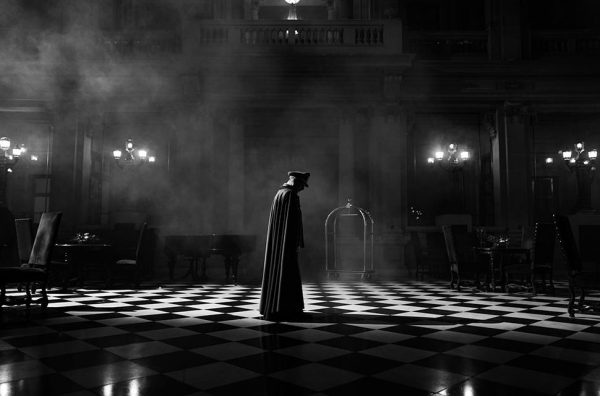
However, Pinochet is up against many factors as he sorts things out. For instance, he has many people trying to influence his choices, including Lucia, Fyodor and his five children. There are also the beliefs and opinions of groups and institutions trying to have their say, whether or not he’s aware of it, including the Church and the Chilean people, constituencies heavily impacted by the deplorable actions of his past. They detest him so much, in fact, that their scorn is largely responsible for having driven him to live in seclusion, an existence that has caused him to lose touch with the outside world and even the possessions he once so zealously adored, such as the now-missing fortune he amassed while in power. All of this has left him directionless, unable to decide which beliefs to embrace for himself.
It could be also argued that his indecision is further driven by an assessment of his past. Having lived so many lives filled with reprehensible behavior, perhaps glimmers of guilt and disillusionment have finally caught up with him. In addition to those many lifetimes where he brutally did the bidding of heinous autocrats as a loyal foot soldier, he’s most recently experienced the kind of unbridled power that his sovereigns did previously. This unchecked lust for control led him to engage in unspeakable practices that could only be described as “vampiric” in every sense of the word. And, despite whatever momentary level of gratification they may have given him while in charge, he was ultimately removed from that position of power by those whom he most sternly controlled, leaving him without what he so jealously craved, as well as any meaningful kind of respect or admiration once out of office, not to mention a satisfying lifestyle in retirement. He can’t help but ask himself, was all the effort that went into creating that life worthwhile in the end, especially since everything he coveted has now gone away? What’s more, despite the ability to re-create those conditions in a new life for himself, does he want to go through that potential disappointment once again or just slip away and die? Regrets can carry considerable weight as beliefs, and they can make it easy to give up and look for a new path to follow, especially when heavily tinged with such pervasive discouragement.
Then again, maybe it is worth taking another stab at it, particularly when “incentives” emerge, such as the presence of the lovely Carmencita. Pinochet’s attraction to her is obvious, and, over time, she begins returning the lustful admiration, despite her vows and supposedly sacred mission. And then there’s the influence of the mysterious narrator, who offers some startlingly attractive propositions upon her arrival. Given Pinochet’s nature, these inducements might easily prompt him to change course and begin craving the old ways once again.
What will he decide? Will he sincerely follow a path of atonement and redemption by choosing a new course? Or will he slip back into his old self, returning to a life of self-serving avarice? The choice – and the beliefs behind it – are his, just as they are for any of us. We might like to hope he chooses wisely, but that decision is on him – one that he won’t be able to make until he’s ready to do so, a circumstance that’s as true for him as it is for us, no matter how patently obvious the choice may seem. Until that time, though, he’ll have to put up with whatever ancillary consequences accompany his choice, for better or worse.
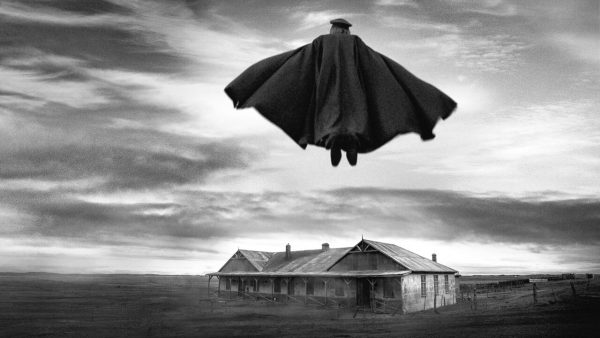
Fusing cinematic genres can be tricky, especially if the mix doesn’t mesh. But the latest from writer-director Pablo Larraín successfully pulls off a brilliantly original blend and does so just about perfectly in this metaphorical account of the life of the onetime-Chilean strongman as a vampire a la Dracula (hence the title and the character’s nickname, “the Count”). As the elderly former dictator assesses his options for the future, many story threads emerge and become intertwined, satirically invoking wry observations about despotism, greed, power, lust, immortality and religion. On top of all this, there’s the hilarious appearance of the faceless narrator whose unexpected appearance late in the film takes things in an entirely new uproarious direction with deliciously twisted plot developments. Add to all this the film’s stunningly gorgeous monochrome cinematography, superb production design, fine performances and positively sparkling screenplay, along with just enough restrained campiness in the dialogue and special effects to make viewers giggle with delight without becoming silly, and you’ve got one finely crafted production, perfectly integrated and nicely balanced. Admittedly, the pacing drags a smidge late in the second act, but that’s easily dismissed considering how well everything else works together. Also, the film is quite graphic in a number of sequences, so squeamish and sensitive viewers would be wise to avoid this one. But, if you’re not faint of heart and have an appetite for the macabre, give this Netflix exclusive a look. Director Pablo Larraín’s pictures keep getting better and better with every outing, and this is the latest in a string of releases that have firmly established him as one of the finest auteurs in the business these days. Tune in and see for yourself.
It’s no secret that “absolute power corrupts absolutely,” and Pinochet certainly proved that during his 17 years in office. By the same token, it’s also been said that “what goes around comes around,” as this offering so deliciously illustrates, leaving one destitute, disillusioned, indecisive and morally bankrupt in light of a legacy of unspeakable transgressions. This is one hell of a cautionary tale for those who seek personal gratification at any cost, those who blindly ignore the impact on those around them, as well as themselves. Our vast creative powers can indeed be put to many valuable uses, but we must choose our options wisely, no matter how many chances we may get – or how many lifetimes we may live.
Copyright © 2023, by Brent Marchant. All rights reserved.

No comments:
Post a Comment